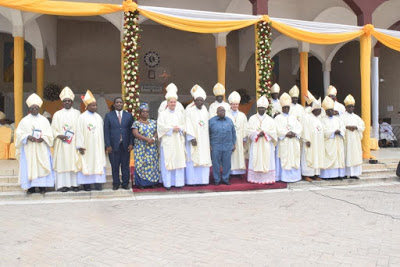TANZANIA: Church Request Government To Amend Law Which Consider Missionaries As Investors.

The Catholic Church in Tanzania has requested the Government to amend the law of immigration and foreign employment that recognizes missionaries as foreign investors.
Speaking on behalf of Tanzania Episcopal Conference, the President of PMS Most Rev. Damian Denis Dallu said this during the Climax of the Extra Ordinary Month of Evangelization which took place on 10th November in the Archdiocese of Dar es Salaam. The Eucharistic celebration was presided by Most Rev. Gervas Nyaisonga the President of Tanzania Episcopal Conference and Archbishop of Mbeya.
Most Rev. Damian Dallu who is also Archbishop of Songea said that missionary work is not a remnant of colonialism or investment yet the Tanzanian Act No. 1 of 2015 on Immigration and Foreign Employment recognizes expatriate missionaries as foreign investors.
The Constitution Art. 19 states that “everyone has the right to freedom of thought, belief and choice in matters of religion, as well as freedom of religion or religion. Without prejudice to the applicable laws of the United Republic, the work of proclaiming religion, worshiping and disseminating religion shall be independent and voluntary, and the activities and operation of religious communities shall be outside the duties of the country.”
The Bishops argue that the law should be amended because it confuses the Church as well as the Government.
Most Rev. Damian Dallu insisted that, the provisions of the Constitution of the United Republic of Tanzania emphasize the functioning of religious institutions to be free, without interference by any person or entity to protect freedom of worship.
He said that the Church through its various activities of building, strengthening and protecting people spiritually and physically, clearly shows the contrast with colonialism that ended on December 9, 1961 and left the Church to grow and mature.
“This proves clearly demonstrates that missions are not colonial remains,” he said.
He emphasized that as Pope Benedict XV once emphasized, missionary activities should be far from the activities of the secular world and that missionaries should avoid any form of self-interest in their work and instead focus on finding and spreading Christ.
He further insisted that there must be distinction between missionaries and wage earners and commercial investors, arguing that it it is high time the law relating to residence permits for foreigners including missionaries is reviewed.
“Missionaries should not be considered foreign laborers. By whom are they employed? When this law is repealed, missionaries will not be required to apply for such work permits, their living and working will not be limited,” said Bishop Dallu.
“This law is very confusing and worrying for both the Government and the Church as it requires the missionaries to apply for a permit every two years and, further, limits the missionary to work in the country as it stipulates that after five years, he or she must leave,” he said, adding that the result of it is ineffectiveness of missionary activities in the community which include running schools, hospitals and other social projects.
On his part, the President of PMS Archbishop Gianpietro dal Toso who came from the Vatican said the Church in Tanzania and the continent of Africa is increasingly becoming missionary to different parts of the world.
“Faith in Africa grows very fast and missionaries from Africa are now going throughout the world to preach Good News. It is impressing to see the faith growing,” he said.
He said he was surprised to see the faith in the Tanzanian Church especially how the Church engages children in matters of faith in the Church of the Holy Child.
The Nuncio to Tanzania Most Rev. Marek Solczynski, also encouraged the Church in Tanzania to invest more in evangelization at all levels from the family, Small Christian Communities, parishes up to the Diocese.
He said that he continues to pray for the mission of the Tanzanian Church and Africa in general to continue growing in all aspects.
By Sarah Pelaji


